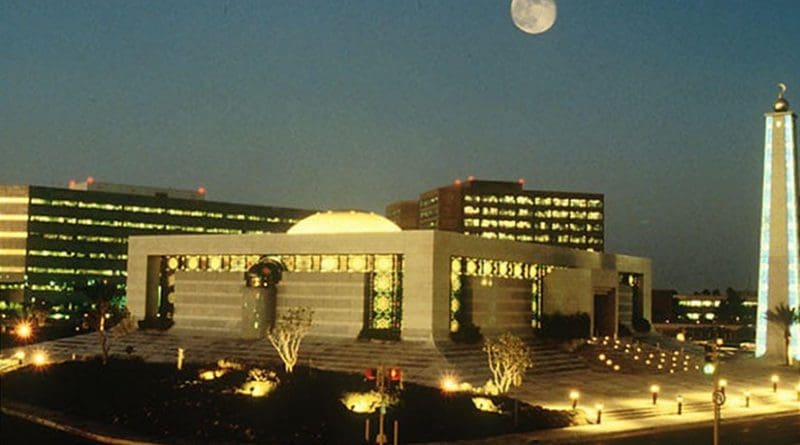Tokyo’s Aramco Moves – Analysis
By Robert Held*
At the height of its asset bubble in the late 1980s, Tokyo boasted more than 100 foreign companies listed on the Tokyo Stock Exchange. Since the bubble burst in the early 90s, that number has dwindled down to a measly six. With the Saudi national oil company, Aramco, preparing to list the overseas portion of its planned IPO, both Shinzo Abe and the Tokyo exchange have put out all the stops in hopes that the Saudis can be convinced to look past hot favorites London and New York and choose Japan. With a final decision due by the end of the year, can Japan really upset the world’s foremost stock exchanges?
The stakes could not be higher for everyone involved. Assuming a maximum valuation of $2 trillion for the company, the IPO (which would cover 5%, or up to $100 billion) has the potential to singlehandedly put Tokyo back on the map as a desirable destination for foreign companies. The Saudi government has taken several steps to boost the valuation over the past several months, clarifying the company’s non-oil activities and taking some liabilities off its hands.
While the Saudis focus on augmenting Aramco’s value, the Japanese government has actively tried to influence their deliberations over competing exchanges. The courtship began in September last year, when then-Deputy Crown Prince Mohammed bin Salman travelled to Japan to meet with Abe. Since then, Riyadh has hosted a series of trips by officials from the TSE, although the visitors have had difficult questions to answer as to why the Saudis would choose a destination other foreign companies have abandoned in droves.
The Japanese responded by arguing that New York, London and Hong Kong are all dominated by the same large institutional investors. Tokyo, as Hidetoshi Nagata of the TSE argued to CNBC, offers a deep investor base as well as high-net worth individuals who add to available liquidity. Japanese officials tout the fact that Japan has become the Kingdom’s largest Asian market for its oil exports, in the hope that this will serve as a segue for the deeper integration of the two economies.
Tokyo has not been the only earnest bidder, though, and certainly has not been alone in throwing the weight of the government behind its entreaties. No suitor has been more willing to bend over backwards to win Aramco than London; indeed, the City has come in for unusually strong criticism for the lengths it has gone to in boosting its chances. Earlier this month, the UK’s Financial Conduct Authority proposed new rules specifically tailored to state-owned companies (read: Aramco) that would allow them access to London’s premium listing regime. The new rules will ease a number of restrictions concerning transactions between the company and its state owner, facilitating the listing process.
While these bespoke rules were likely written to Aramco’s requirements, they also indicate a broader change in London’s strategic outlook. The UK looking to fashion new trade relationships to soften the blow of Brexit, regulators have recognized that new paths needs to be tread to ensure Britain retains its place as one of the world’s foremost finance centers. For the first time, the new listings regime targets state-owned firms directly, meaning that the London Stock Exchange has now effectively broadened its ability to cater to the interests of both state-owned and private entities, who differ significantly in their motivations and nature.
Japan will have a hard time matching this gesture, especially as the Japanese finance sector has traditionally been less receptive to energy companies. Investment activities have squarely focused on the tech sector, and the TSE’s policy of prioritizing tech companies led to a business strategy designed to facilitate the listing of tech start-ups for fundraising.
Geopolitics will also help Japan’s competitors, the British more than most. UK-Saudi relations already run deep, and Saudi Arabia is the UK’s biggest trading partner in the Middle East. Between them, the two kingdoms shared joint investments worth $13.8 billion in 2015. Since the Aramco listing is part of a broader set of economic diversification plans, Prime Minister Theresa May has been working hard to frame her country as a willing partner, and ensure that British companies are at the front of the line to take part in Saudi’s reform-driven economic restructuring.
As the British (and first female) leader to attend the Gulf Cooperation Council’s summit last December, May laid groundwork towards a future free trade deal and promising investments in infrastructure and healthcare. Within a week of triggering Article 50, she went back to the region accompanied by the LSE Chairman Xavier Rolet, expressly to make the case for London as the best location for the Aramco IPO.
It’s hard to see how Japan’s bid to win the Aramco listing can beat out competition from London and bourses better-suited to carry energy-related IPOs. Tokyo, though, has already come away from the broader economic changes in Saudi Arabia with a huge consolation prize: the Softbank Vision Fund. With this tie up between the Saudi sovereign wealth fund (PIF) and Softbank, the Japanese technology firm will be one of the world’s biggest tech investors over the coming years. The PIF will largely be financed with the proceeds of the Aramco privatization, meaning Japan will still have a major role to play – even without the listing.
* Robert Held is a financial consultant specializing in international finance and transnational tax law, and lives in Geneva, Switzerland.

